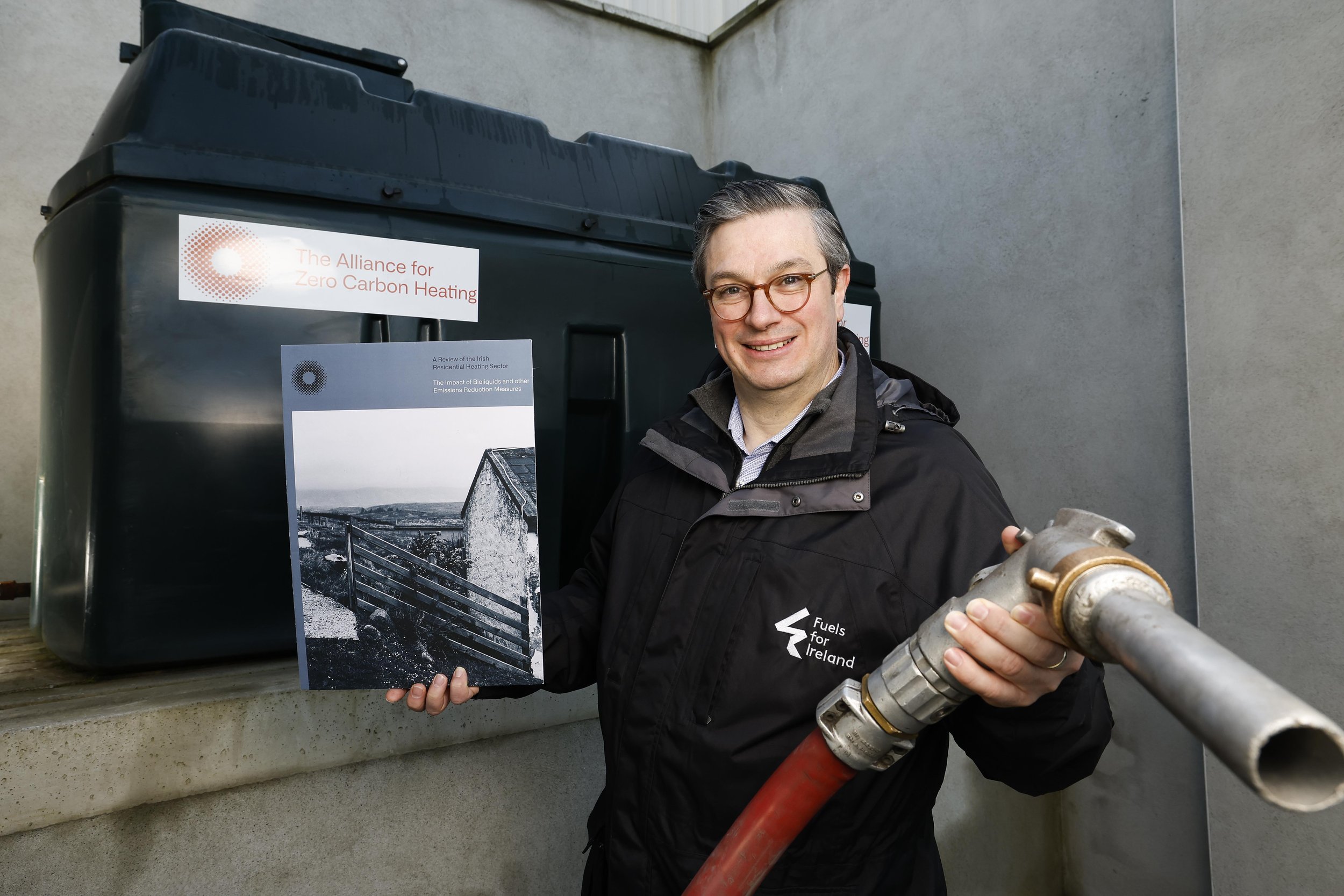Kevin McPartlan, CEO of Fuels for Ireland, and one of the founding members of the Alliance for Zero Carbon Heating, launching a report showing that switching to bioliquids could reduce emissions from home heating more than heat pumps
Report shows switching to bioliquids could reduce emissions from home heating more than heat pumps.
January 24th 2022 - NEW research from the world-leading consultancy firm AECOM has demonstrated that new liquid heating fuels could dramatically reduce emissions in Ireland’s home heating sector.
Nearly 700,000 Irish households currently use oil to heat their homes. Although the Government is determined to retrofit 500,000 homes by 2030, the prohibitive costs involved have resulted in slow progress, coupled with the ever-increasing fuel prices being experienced by households.
AECOM’s report titled ‘A Review of the Irish Residential Heating Sector’ shows that switching to a 50% biofuel blend could reduce emissions more than switching to an air source heat pump. AECOM also found that it costs more than twice as much for a household to switch to an air source heat pump, compared to what it would cost to switch to a viable alternative including biofuel.
Kevin McPartlan is CEO of Fuels for Ireland and the spokesperson for the newly-launched Alliance for Zero Carbon Heating, which commissioned this research. He said that the findings show the role which new liquid fuels and blends can play.
“All across the country, people want to make their own contribution to reducing emissions, and the new liquid fuels which are coming online could allow them to do just that. AECOM’s new research demonstrates that the use of a 50% oil and biofuel blend would produce 40 tonnes of CO2 emissions over 10 years, compared to the 53 tonnes produced by a heat pump. Helping homeowners move to biofuels would be a fantastic outcome which is financially within the reach of virtually all consumers,” McPartlan said.
McPartlan also noted that the installation of heat pumps often requires extensive deep retrofitting processes which impose a far greater financial burden.
“Given that the average cost of such a retrofit is €56,000 - and given that the average grant in 2021 was €15,000 - it is easy to see why this is unaffordable for so many households, why uptake has been so low, and why the Government is lagging behind their targets,” McPartlan said.
The Alliance for Zero Carbon heating has been established to ensure that Irish consumers have choices when it comes to their home heating needs which also reduce carbon emissions. The Alliance is made up of Fuels for Ireland, UK and Ireland Fuel Distributors Association (UKIFDA) and OFTEC, the trade organisation for heating and cooking industries in the UK and Ireland.
The members have pledged to reduce greenhouse gas emissions from their products by 50% by 2035, while doing everything they can to achieve zero carbon heating as soon as possible.
The Alliance for Zero Carbon Heating is now developing pilot projects in Ireland which will see these new liquid fuels being used in demonstrator projects.
McPartlan called on the Government to incentivise a shift towards fuels which can dramatically reduce carbon emissions in the coming years, including alternatives which can cut emissions by up to 86%.
Citing the example of the Biofuels Obligation Scheme in the transport sector and how it had helped to slash emissions, he called on the Government to ensure that the low carbon alternatives are not taxed in the same way as kerosene. He also added that they need to engage directly with the industry to develop a system of energy credits which would incentivise further progress in this area.
“Up until now, around four in ten Irish households depend on oil – including an overwhelming majority of households across broad swathes of rural Ireland – have not had a real choice, and they have been feeling the effects of sharp rises in carbon taxes and other cost increases due to Government actions.
“But the AECOM research demonstrates that solutions are now on the horizon which will allow those who currently rely on oil to significantly reduce their carbon emissions at an affordable cost. And we in the Alliance for Zero Carbon Heating will do everything in our power to help them do this.
“Advanced, renewable, synthetic and biofuels will be a crucial part of meeting home heating needs and achieving net carbon neutrality, and it is time for the Government to take the steps needed to accelerate this transition,” McPartlan concluded.

